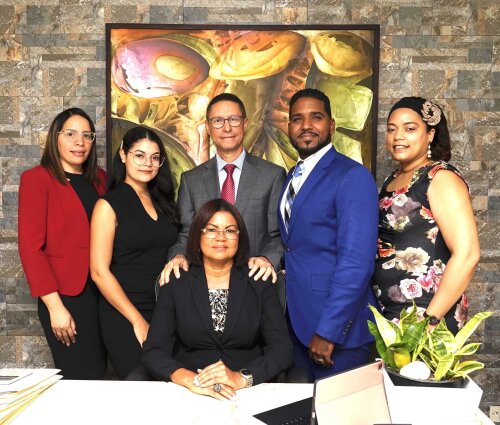Best Domestic Violence Lawyers in Dominican Republic
Share your needs with us, get contacted by law firms.
Free. Takes 2 min.
Free Guide to Hiring a Family Lawyer
Or refine your search by selecting a city:
List of the best lawyers in Dominican Republic
About Domestic Violence Law in Dominican Republic
Domestic violence in the Dominican Republic is a critical issue that affects individuals across all demographics. The country has implemented several measures to combat domestic abuse, including comprehensive laws and policies. Notably, the Law 24-97, an amendment to the Criminal Code, was enacted to address domestic violence, providing protection and resources for victims while establishing penalties for perpetrators.
Why You May Need a Lawyer
If you are affected by domestic violence, seeking legal help can be crucial for several reasons. A lawyer can help you understand your rights, navigate the legal system, and represent you in court proceedings. Common situations where legal assistance may be required include filing for protective orders, seeking custody of children, initiating divorce proceedings, or pursuing criminal charges against an abuser.
Local Laws Overview
The Dominican Republic's legal framework for domestic violence is largely defined by Law 24-97, which categorizes domestic abuse as a public crime, meaning it can be prosecuted without requiring a victim's formal accusation. Key aspects of this law include:
- Protection Orders: Victims can request restraining orders to ensure their safety.
- Criminal Penalties: Law 24-97 includes specific penalties for physical, psychological, and sexual abuse within domestic settings.
- Support Services: The law mandates the creation of victim support services, including safe shelters and counseling.
- Awareness and Education: Initiatives to prevent domestic violence through education and public awareness campaigns are promoted.
Frequently Asked Questions
What is considered domestic violence in the Dominican Republic?
Domestic violence encompasses physical, psychological, and sexual abuse within familial or intimate relationships. It includes actions that result in harm or suffering to the victim.
Can I report domestic violence anonymously?
Yes, you can report domestic violence anonymously through various hotlines and to the authorities. Anonymous tips can help initiate investigations, though non-anonymous reports might carry more weight in legal proceedings.
What steps should I take if I am a victim of domestic violence?
If you are a victim, it is essential to seek immediate safety, whether through friends, family, or shelters. Contact the authorities to report the abuse and reach out to legal professionals to explore your options for protective orders and legal actions.
How can I obtain a protection order?
Contact a lawyer or a local support organization to assist you in filing a request for a protection order. They will guide you through the necessary legal proceedings and ensure that you provide all required information to the courts.
Will my abuser be arrested immediately after I report?
Arrest procedures depend on the evidence and situation at hand. However, the police can take immediate actions to protect victims, which may include detaining the abuser if deemed necessary.
What resources are available for victims of domestic violence?
Numerous resources, such as shelters, hotlines, and counseling services, are available. These provide immediate support, long-term assistance, and guidance on legal actions.
Can I still pursue divorce if I am not legally separated from my abuser?
Yes, you can pursue a divorce based on domestic violence grounds without a legal separation. Consulting a lawyer will provide clarity and assistance in these proceedings.
How does the legal system protect children in domestic violence cases?
The legal system prioritizes the safety and welfare of children, offering protective measures and ensuring they are placed in safe environments away from abusers.
What role do witnesses play in domestic violence cases?
Witnesses can provide crucial evidence supporting the victim's claims and help build a stronger case against the abuser in court proceedings.
Can both men and women be victims of domestic violence?
Yes, domestic violence affects both men and women, though women are statistically more likely to be victims. Legal protections are available to all victims regardless of gender.
Additional Resources
Several organizations and governmental bodies provide support to domestic violence victims:
- Ministry of Women: Offers guidance, support services, and ensures enforcement of laws protecting women's rights.
- CONANI (National Council for Children and Adolescents): Provides resources and support for children affected by domestic violence.
- Public Ministry: Oversees the legal processes in domestic violence cases and offers accessible services to victims.
- Local NGOs: Non-governmental organizations throughout the country offer various support services, including counseling and legal assistance.
Next Steps
If you need legal assistance regarding domestic violence, consider taking the following steps:
- Contact a legal professional or organization specializing in family law to advise and represent you.
- Document all instances of abuse, including physical evidence, photographs, and communications.
- Reach out to domestic violence hotlines or shelters for immediate safety and support.
- Educate yourself on your rights and the legal processes involved in domestic violence cases.
- Consider joining support groups for emotional and psychological support during and after legal proceedings.
Remember, seeking timely legal advice and support can significantly affect the outcomes of domestic violence situations and provide the necessary protection and resources you need.
Lawzana helps you find the best lawyers and law firms in Dominican Republic through a curated and pre-screened list of qualified legal professionals. Our platform offers rankings and detailed profiles of attorneys and law firms, allowing you to compare based on practice areas, including Domestic Violence, experience, and client feedback.
Each profile includes a description of the firm's areas of practice, client reviews, team members and partners, year of establishment, spoken languages, office locations, contact information, social media presence, and any published articles or resources. Most firms on our platform speak English and are experienced in both local and international legal matters.
Get a quote from top-rated law firms in Dominican Republic — quickly, securely, and without unnecessary hassle.
Disclaimer:
The information provided on this page is for general informational purposes only and does not constitute legal advice. While we strive to ensure the accuracy and relevance of the content, legal information may change over time, and interpretations of the law can vary. You should always consult with a qualified legal professional for advice specific to your situation.
We disclaim all liability for actions taken or not taken based on the content of this page. If you believe any information is incorrect or outdated, please contact us, and we will review and update it where appropriate.
Browse domestic violence law firms by city in Dominican Republic
Refine your search by selecting a city.
















